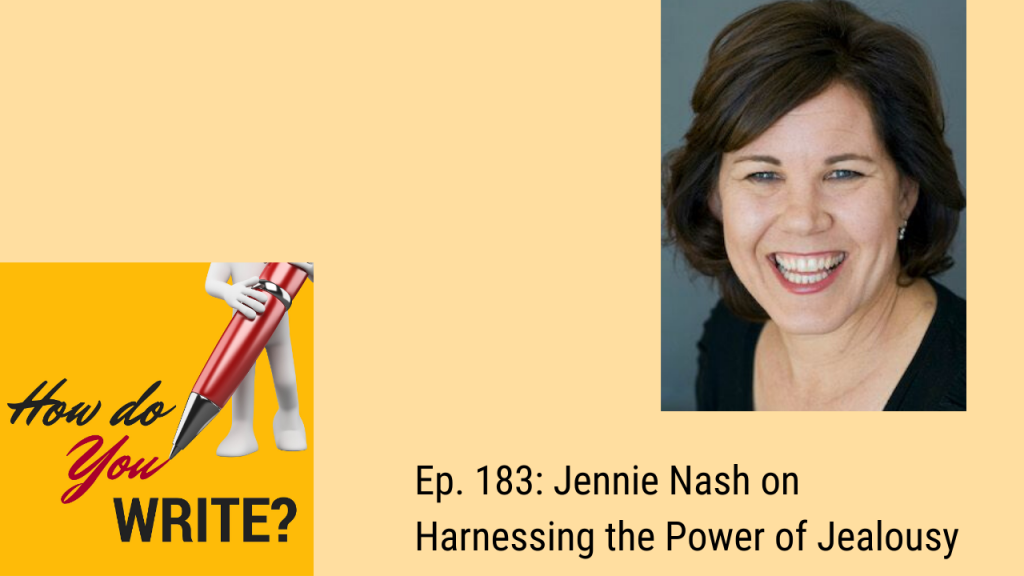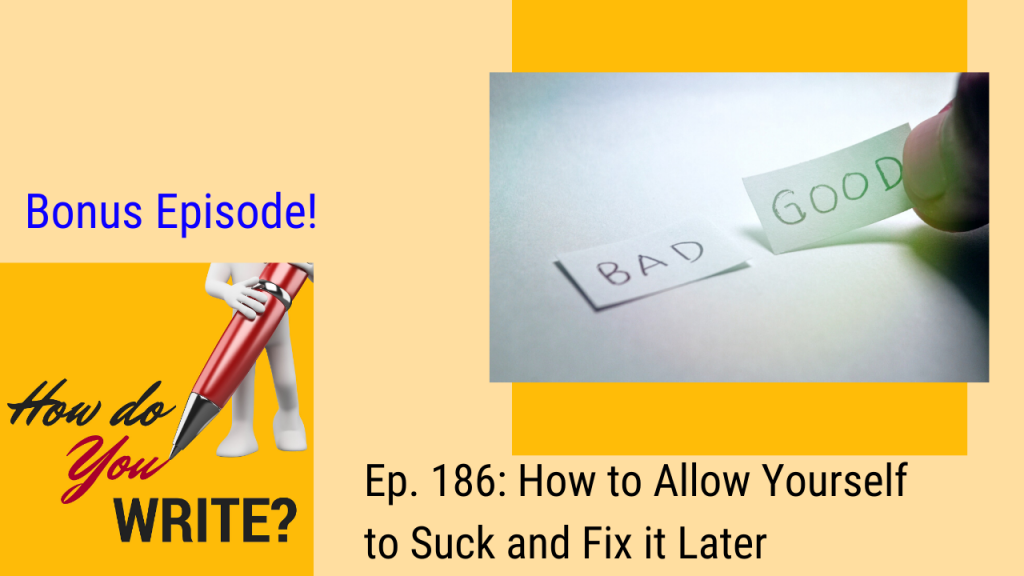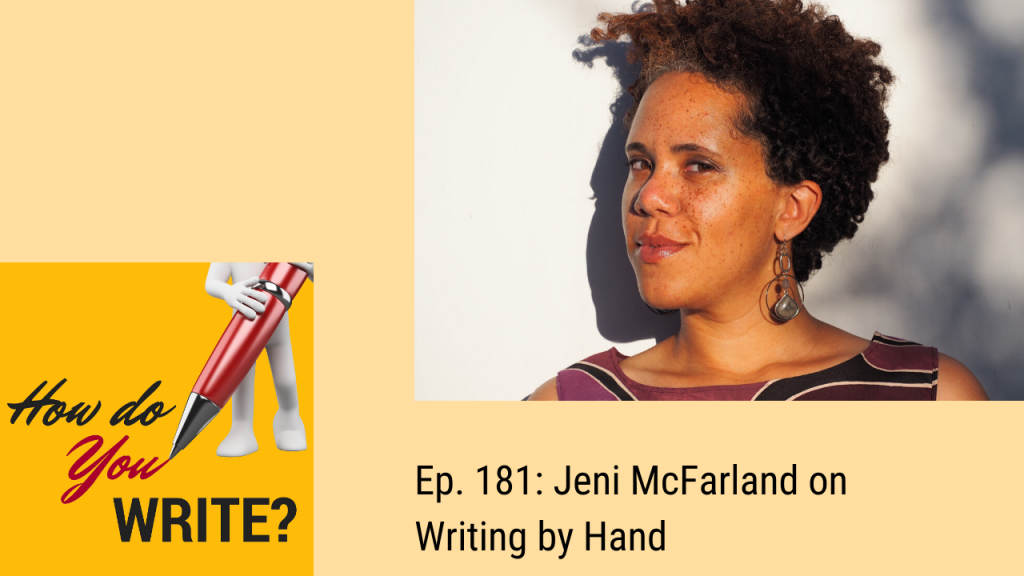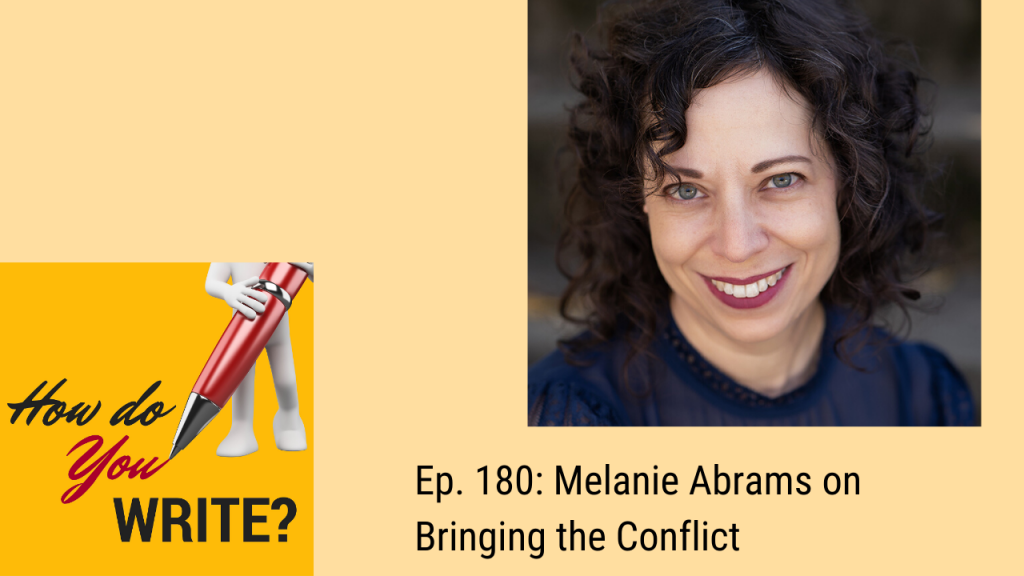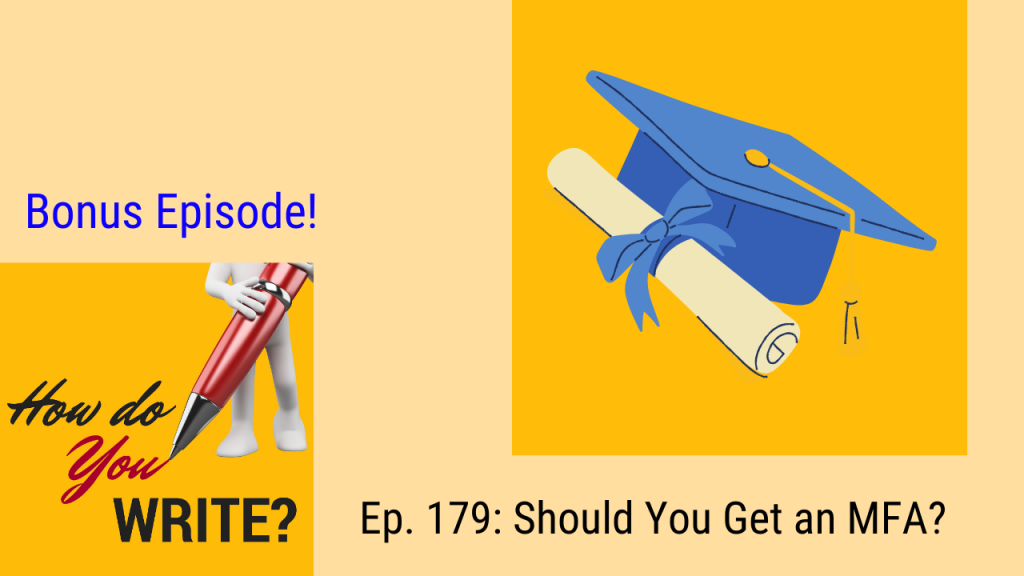Should you build a mailing list or reader following while you’re still working on your first book? How do you find a community of writers? (Hint, join my Slack channel, link below!) And how should you write transitions between scenes? All this and more, in this episode with Rachael Herron!
How Do You Write Podcast: Explore the processes of working writers with bestselling author Rachael Herron. Want tips on how to write the book you long to finish? Here you’ll gain insight from other writers on how to get in the chair, tricks to stay in it, and inspiration to get your own words flowing.
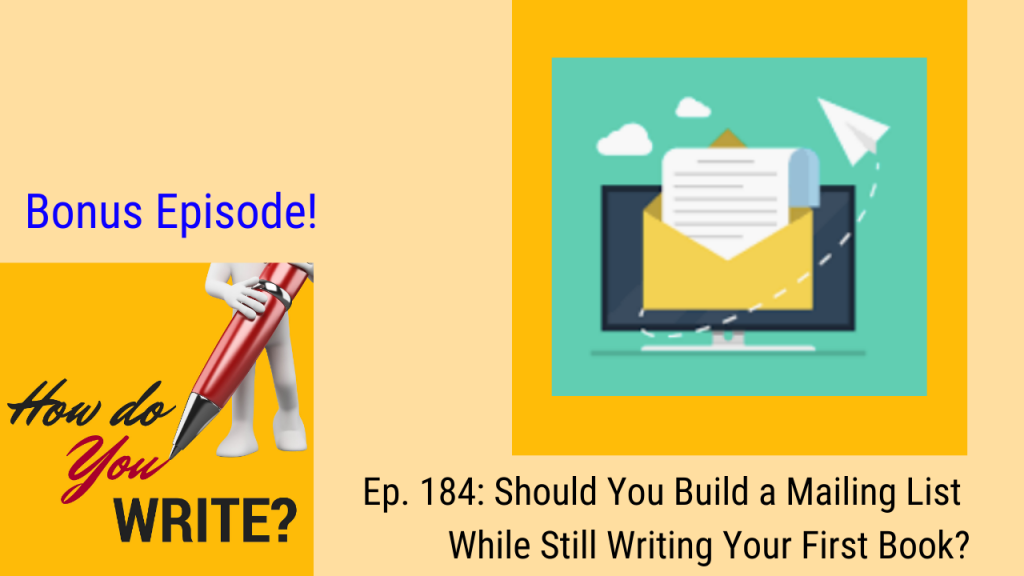
Transcript
Rachael Herron: Welcome to “How do you Write?” I’m your host, Rachael Herron, and this is a bonus episode brought to you directly by my $5 Patreons. If you’d like me to be your mini coach for less than a large mocha Frappuccino, you can join too at www.patreon.com/rachael
[00:00:16] Well, Hello writers! Welcome to episode #184 of “How do you Write?” I’m Rachael Herron. Thrilled that you’re here with me on this mini episode, if you are one of those people who hears numbers and remembers them, just please know, I have been dreadfully confused, verbally about what number episode I’m on. I think I’ve been telling you I’ve been on 186, 187. I’m actually on 184, the numbers are right in your Podcatcher. If you hear me in the past, say something you’re like, where did I miss three episodes, 4 episodes, maybe 10 episodes, I don’t know. I was just getting it wrong so you can disregard that. [00:00:52] Welcome. Welcome. I’ve got some questions to answer. These are from the $5 patrons and thank you, patrons as always for supporting me in this mini coaching way. I really like to collect them and go through them. I’m going to try to get through 3 today. You can always check out that patron level at patreon.com/rachael. I think I say that in the opening of the mini episodes, but yeah, no, there it is again. Very quick catch up for you on what’s going on around here. I am, I think I mentioned this last week under the gun again for revision. This is my editor’s revision due a week from today. And my friends, I may not make this deadline. I don’t know, I’m going to work my hardest. I have just been such a fractured writer person. I’m using all of my tools. I have a very big toolbox of things to use when I’m having a hard time focusing. That’s why I do this podcast is to give you better tools for your toolbox. And I am constantly having to remind myself. So if you’re struggling with this too, you’re not alone. I’m constantly reminding myself what those tools are, where to find them, how to use them, how to remember to use them. After I post this podcast, I’m going to remember to move my computer. It’s literally a shift of 45 degrees instead of facing this way. I’m going to face that way out the window. That is my writing revision spot that I’ve set up during quarantine. Usually my writing revision spot is not in my house, but that is this tiny little space that I managed to clear out of my office to do the actual writing and revising. This particular revision is taking some extra first d- quite a bit of first drafting. Which is then followed by revision of that first draft and then another revision so that it kind of smooths to match the rest of the book in any case I’ve been forgetting to use that space and I’ve- yesterday, all day I struggled because I was sitting in my work spot. This is where I do my busy work. This is where I do my email and my podcasts and my marketing. What little I do. I forgot to go to my writing space and all day I had this girl brain. So I just forgot that tool. [00:03:21] Speaking of tools, I would like to, before we get into questions, tell you about something really special that’s being offered by my friend, and cohost of the podcast, the Writer’s Well, J. Thorn, he is offering something really cool. He is kind of the master of the scene as a tool using each scene and making it as strong as it can be. I have actually signed up for this free course. It’s completely free. It’s a 5-day writing challenge called Supercharge Your Scene, and I can’t recommend anybody more to teach this. So it’s at superchargeyourscene.com You just sign up, it’s free, then you are in it. You’re going to do prep work. Talk about why you must write a scene, how to frame it, how to ignite the motivations of your protagonist and your antagonist. How to guarantee that your scene or article explodes on the page. That’s what I need cause my people talk a lot. How to create a difficult, complicated decision for your protagonist, that readers can’t possibly ignore, and don’t forget when I say protagonist, I also mean you, you are the protagonist if you’re writing your memoir. None of this doesn’t apply to you. You must supercharge each scene, whether it’s fiction or memoir. And decide how, or no you learn how to utilize the protagonist consequence when you start the next scene. I have no idea what that means. J. is smarter than I am about scenes, so go to superchargeyourscene.com. Sign up for that. It is running June 15th through 19th, 2020, depending on when you’re listening to this, I hope you get a chance to sign up. I’m going to be in there. Totally free. And also I was supposed to announce that each time I’ve been co-hosting over at the Writer’s Well with new people, J’s been off for three weeks and I keep forgetting. So I wanted to make sure I, I told people about that here. [00:05:19] Okay. Let’s get into some cool questions. This is from Leftie. Leftie, I’ve been hanging on to this one for a while so I apologize for the delay. Leftie says, I thought I heard you say in your mini episode about draft passes, and that was brilliant by the way, it’s such a great technique. Thank you. That you were low on questions for your mini episodes and I happen to have one, of course you sent one and then it sat there because I had others. I, she goes on to say, I’ve finished the first draft of the horror novel about a mother and her baby that I told you about. Yes. So happy. Congratulations for you Leftie. It’s the first novel I ever planned before writing the first draft and it made such a difference. I have a much stronger draft and now I’m revising and now I share your love of revisions. Yay! My question is this, “How do you handle transitions in your novels?” By transition, I mean, a paragraph or two that tells the reader that time has passed and what the characters did during this period of time, without it being a fully formed scene, how do you keep them interesting? How do you know when you’ve got too much of them or when you should add one? I feel like minor weak at the moment, and I don’t know what to do about it. Thank you so much. [00:06:28] Leftie, this is such a good question and I want to point out that this is something I do very badly in a first draft. I do not worry about it at all. A lot of times I’ll put in just a note to myself in my first draft. This is seven days later. This is three days later. This is a month later or a little bit worse, but this is actually what I do more is I don’t put anything in, I forget to do anything. And timeline is one of my big things that I’m thinking about in my big, make sense draft. I actually, if you’re watching on the video, I usually print out a 3-month blank grid, a blank calendar, and it’s the same calendar that I use to block out my writing time. It’s this, but this one is unique for this book and I put the things that happen on this calendar, is a physical timeline, I do it in pencil during that revision so I can erase things and move them around. When I’m in revision is when I’m deciding how much time has passed between things. Your question is specifically, how do you make that transition from a scene, to a scene where time has passed in between. And the answer is, do it as simply and as quickly as possible. It’s one of those invisible things that the reader’s brain needs, but isn’t interested in. So in order to do it in a non, you can do it in a boring way. You can say nine days later, comma, she, open the door to the grocery store. That’s pretty boring, but it gets the job done and is basically invisible to the reader. It’s like he said, she said they convey information that the back of their reader’s mind picks up on and stores but isn’t going to slow them down. A little bit more interesting of a way to do it, I can hear my cats fighting in the background, is to give it a sentence or two something like three grocery deliveries. Let’s see. Three grocery deliveries, 47 emails and 117 for getting to shut the cabinet drawers, Lacy walked back into the grocery store. You know what I mean? So it’s a, it’s giving a capsule snapshot of what has happened before this next scene. The thing to avoid is really boring ness. Like on Tuesday, Lacy stayed in bed. On Wednesday, Lacy answered the phone seven times and managed to work for two hours. On Thursday, wherever we are in the week. You don’t need to fill the reader in on everything that has happened between the time, what you do need to mention or gloss over is anything that applies to their, your plot or that is kind of a better more lyrical way to get there. It doesn’t have to be very lyrical. Like I said, again, it’s just got to convey the impression that time has passed and readers don’t really care how you do it. So my really short answer, is do them as quick as you can, and as simply as you can. It’s- I can never find this quote, but if anybody wants to look it up for me I’ve been looking for it. Somebody famous said something like, sometimes you just have to get your character to open the door. Open parentheses, he opened the door, close the parentheses there, the door is open. Sometimes you just have to say, you have to tell something and you just do it. Flatly it’s done. You can move on to the interesting part of the book. [00:10:17] So, Mae Merrill says recently RWA is going through let’s hope it’s a temporary cluster-fuck. And until they figure out their shit is not an organization, I want to be part of. Same, that being said, I want to find a place where I do belong and can be part of a community of writers. This is especially difficult since I’m living in Korea for the next few years, and I am not on a base or anything like that. Are there places that offer that sense of community and maybe resources that can help writers preferably of all genres and levels? I do not know, Mae. This is such a difficult question. RWA was such a good thing, but it had this underlying systemic racism that is the – or the underpinnings of American society. It was just baked into its very DNA. So untangling that is going to be a big job. And I am not going to be part of that as I have made clear on the show. Don’t hold much hope for RWA, really changing, although I have heard that they’re doing some things that might could help. I don’t know. I’m just keeping an eye on that. In terms of an organization that kind of includes everybody, there isn’t one and I am not meaning to you’ve actually, you’re, you’re helping me to do this. I am not doing this to toot my own personal horn or whatever phrase you want to use for that, but I do have a free slack community. There are about 400 of us in there. It goes from absolutely no participation, like no one’s interacting in there to really, really busy. It is user driven. I am trying to be more active in there. I just put a sprint channel into our community. So, as soon as I did, somebody said, I’m going in in 10 minutes, who wants to join me? So I’m going in at 10:00 AM Pacific standard time this morning, which isn’t about an hour and seven minutes. And I posted that in there. So you can see where, when I am working and you can work alongside me. If you want, you can work alongside other people. In one of my classes, the other day, there was a sprint discussion that had 184 comments on just this one sprint. As people came in, did their work said, okay, I’m going back, I’m going to do some more. I got an 800 words and they would just type back to each other back and forth. It was so freaking inspiring. So we’re going to do that over in my Slack channel in order to find my Slack channel, please come to howdoyouwrite.net Look at the show notes for this episode. The link is always in the show notes for my podcast. I try to keep it the most recently that hasn’t expired and it seems to be working, this link doesn’t expire. It’s totally free. It’s always going to be free. It’s a place to come and talk about writing. Talk about your difficulties, there’s a whining section, there’s a celebration section. I would love, love, love to have you there if you’re not in it already. And I know that you are probably, isn’t that creepy? When my dogs walk in my room and my door creeks like that, I was genuinely a little bit scared. [00:13:40] May I know that you were listening, you were hoping that I would tell you about some awesome resource that is out there that doesn’t really exist. As far as I know again, if somebody is listening to this and they’re like, Oh, I know what that community is. It’s all genres, all levels, everyone is welcome. Please come put that in the comments at howdoyouwrite.net because I would really love to know if there is something. But in the meantime, if you want to join my Slack community of writers, please do. It’s an awesome, awesome place. [00:14:08] Okay. And the last question is from Thoumas. Hello, Thoumas he says, how early should I start building my reader base mailing list, et cetera. I’m in the early stages of revising my first book and I have no online presence as a writer since my life is so hectic, I can only write about an hour a day and I’m not keen on diverting my writing time to trying to build a following while I’m still working on the manuscript. But do you think it would be worth it at this point? Even if it will dramatically slow down finishing the book? I’m so excited to answer this one because the answer is no. Do not try to build up a fan base mailing list, anything of the sort while you’re writing, revising, polishing, getting editor revisions, anything else on a first book. The exception to this is if you want to be traditionally published, and you want to get an agent, and you want to impress them and the editor, she will sell it to you, then definitely get an online presence and get a hundred thousand followers that will impress an agent or an editor. Anything under a hundred thousand followers, they don’t care about. I have been on social media forever, and I have a good following. I probably have, I don’t even know how many I have I think maybe 6,000 on Facebook over both professional and personal pages. I’m looking at Twitter, which is probably my preferred online presence. I have 4,800 people let me glance at Instagram and I will tell you basically what I’m proving to you is that I have been working on this for a long time, trying to build up a following. I have less than 3000 followers on Instagram. There’s no way you’re going to get to a hundred thousand followers unless you’re like some kind of like internet, YouTube superstar kind of thing. So for us mere mortals, they don’t care, knowing that you have 25 people on your mailing list or even 2,500 does not matter to an agent or an editor. So, there’s no reason to do it besides the whole point is, and I think this is what a lot of people get frustrated about, is that how are you supposed to get somebody on your mailing list as a writer, if they can’t read anything by you and they don’t know, they want to read anything by you. So what’s important is when that first book goes out, whether it is self-published or traditionally published, you make sure that you have a way to capture those fans in any way that they come to you. You want, the ideal way, is the number one way, like ignore everything else. The number one way is to get their email somehow that might require, you know, writing a short story that’s a lead in a prequel to your book that they can opt in when they read or offering them a short story when they read your first book and say, here’s a short story that follows the character in the next few months of their lives. Opt in for that, opt into my mailing list to receive that for free. If it’s a memoir, you can offer to tell them another story that didn’t fit in the book that they might want to know about this, either funny or dramatic or poignant. Get them on your mailing list that way. The reason a mailing list is the most important thing you can have, is that they are your subscribers. You can move them around from different platforms that you keep them on. A lot of people start with MailChimp because it’s a good place to start. It’s free up to X number of, I think a couple thousand subscribers you can move them if you don’t like MailChimp, you can go somewhere else. You own that list. You don’t own anything else, you don’t own Instagram, you don’t own Twitter, you don’t own Facebook, and those can change at any point, you cannot rely on followers on those kinds of places. The thing about a mailing list is you never, ever, no matter who you are, and no matter how much you love someone, you never subscribe a family member or a friend, even a close writing friend to your email list without having them opt in. That’s the way to keep your mailing list clean when you get it don’t put your 25 best friends on it. Ask them to opt in and always allow them by using a service to have an unsubscribed button, unsubscribe button. Unsubscribes happen, they are good. They’re self-selecting themselves out of your range because they’re not your reader anymore. If they unsubscribed. Fantastic. We’d love that, but it is not anything you need to worry about now until the first book is. If not out there, it is going out there and you put the link in, or the URL if it’s a print book where they can type in and find you get on your mailing list, that’s the most important thing. So yes, don’t worry your head about it at all until later there’s no reason to. [00:18:48] Let’s see a follow up question. When a writer is looking for an agent, how much- I guess I should’ve have read the questions again before I started talking about them. When a writer is looking for an agent, how much weight did the agents put on writers’ existing reader base and literary presence? Zero. If you have a blog though, I will say this, they will find it and they will read it. And they will use it to judge whether they want to work with you. So if you’ve had a blog in the old days or a live journal that pops up when you Google your name, definitely go over and read it and make sure that it is the presence you want to be presenting to an agent. Agents Google, they need to do a social media search or the people that they’re going to work with. They don’t want to find out that you are flaming people online. They’re not going to work with you. My agent picked me up because she liked my book, but she loved my voice on my blog. She loved that person that she saw on the blog. That was actually she’s told me that that was more valuable to her than my book it’s by itself. So the fact that I had a, you know, a 12-year old blog at that point, it was something. Don’t start a blog if you’re looking for an agent or representation that’s, that’s not useful. They don’t care. They really don’t care. You are a newbie, you’re a debut author, and that brings with it its own awesomeness. Publishers really love debut authors. There’s a reason that they presented Stolen Things, my first novel under RH Herron as a debut author. I was talking about it on the draft to digital spotlight the other day, but that really bothers me. I feel like it is mine, but it is legally allowable and it is what publishers want. Target wants to have debut authors in their store, things that are new and shiny, appeal to customers. [00:20:37] So yeah, you’re, it’s just a, it’s just a bonus that you’re a debut and that you don’t have any of this thing behind you. Let’s see number three, I am a Finnish immigrant and I have been considering coming up with an author name that is easier for readers since my main target audience will be Americans. It’s a toss-up though, because foreign names do have a certain flair in at least some people’s minds. My American wife always says my first name to almost sounds weird to Americans. Thoumas you know, I’ve never thought that, so the author name could be as simple as just changing my first name to Thomas and keeping my last name. Your last name, which I know and you haven’t said it here, so I won’t say it, is easy to pronounce and easy to spell phonetically. The other thing is your last name is unique. It is not, you’re not Thomas Brown, you’re not Thomas Smith or Jones. So I kind of, while I disagree with your wife, Thoumas is almost said, like it’s spelled and it is spelled phonetically, anybody could spell that. It is not a bad idea to think about using Thomas and your last name, because the combination of two unique names is sometimes problematic. So it’s, I would say it’s not a bad idea to consider Thomas plus your last name, that said, if you love your name and want to keep it, do it, it is author’s choice. You get to do that. Yours is not like a check name with 17 consonants and a bunch of phonetic combinations that we don’t normally see, it is not difficult. So you get to, you get to make that decision. [00:22:18] Yeah. So that is the total of the questions. I’ve got another one here but actually I might be answering that in a different way in an episode upcoming. So to my $5 patrons to whom I am your mini coach, I’m ready for some more questions, please. You can send them to me in email or through Patreon or on Twitter or wherever you can find me. So I’ve got to get back to this revision now. I hope that you all are hanging in there through the pandemic and that you’re healthy, that you’re safe and that hopefully you are writing. Oh, and you should come join my Slack. If you haven’t already, I would love to see you there let’s form a community, a real community. It’s already there. So come join it. All right my friends, happy writing.Thanks so much for joining me on this episode of “How do you Write?” You can reach me on Twitter, twitter.com/RachaelHerron, or at my website, www.rachaelherron.com, you can also support me on Patreon and get essays on living your creative life for as little as a buck an essay at www.patreon.com/rachael spelled R, A, C, H, A, E, L and do sign up for my free weekly newsletter of encouragement to writers rachaelherron.com/write/
Now, go to your desk and create your own process and get to writing my friends.
